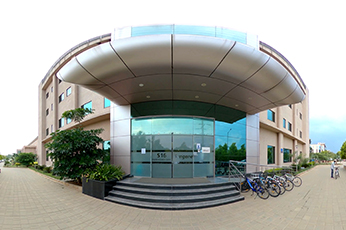Translational insights from multiomics data
We help clients analyze high-throughput data to address complex biological questions, ensuring translation of raw data into meaningful and actionable insights.
Our services
Genomic analysis | Transcriptome analysis | Immunomics | Proteomics | Metagenomics | Biological contextualization |
|---|---|---|---|---|---|
|
|
|
|
|
|
Application areas
- Biomarker discovery
- Patient stratification
- Neoantigen prediction
- Adventitious agent detection in cell lines and biologics manufacturing
- Responder/ non-responder analysis
- Mechanism of action (MOA)
- Novel gene prediction
- Immune repertoire analysis
Genomics
Syngene’s genomic analysis service involves the processing of raw reads, the alignment and indexing of reads with reference genomes, and variant calling and annotation. Every stage of the variant analysis includes stringent quality control measures to assess and improve the quality of reads, remove duplicate mapped reads, and improve accuracy. We have expertise to perform whole genome/whole exome sequencing (WGS/WES) analysis and targeted sequencing. The standard deliverables include quality control (QC) reports, binary alignment maps (BAM ) , variant call format (VCF) files, and annotated variant VCF files.
Transcriptomics
We analyze gene expression data to provide actionable insights across different populations, induced conditions, organs, and environmental factors. Our analysis also highlights broad coordinated trends that are not discernible through targeted assays. We provide standard and customized reporting of transcriptome data across the profiling process that includes quality control checks, transcriptome aligned data, differential expression data, and visualization of differential genes.
Immunoinformatics
Our Immunoinformatics service helps to analyze the data from B-cell and T-cell repertoire sequencing. Our custom pipeline helps in identifying relevant B cell and T cell clonotypes from single cell sequencing or bulk ImmuneSeq data with annotation of variable region and CDR3. We undertake rigorous preprocessing steps to address the correct annotation of highly homologous variable regions. Performance of variability, diversity, and joining (VDJ) assignment pipeline is benchmarked against the commercially available software for BCRseq analysis. In addition to the standard clonotype analysis, we perform analysis for V gene segment usage frequency, V-J combination frequency and repertoire diversity.
Proteomics
We help advance your research programs by providing insights on protein expression, sub-cellular based localization, protein-protein interaction networks/pathways, post-translational modifications (i.e., phosphorylation) as well as quantitative analysis.
We offer proteomics analysis services for label-free quantification (LFQ) as well as chemical labeling quantification through stable isotope labeling with amino acids in cell culture (SILAC), isobaric tags for relative and absolute quantitation (iTRAQ), or tandem mass tag (TMT). We also offer functional and quantitative proteomics analyses of protein-protein associations using gene ontology, enriched pathways, and networks.
The standard proteomics deliverables include reports on normalized peptide abundance, lists of unique and shared peptides, false discovery rate (FDR) filtered peptides, and lists of proteins and their abundance.
Metagenomics
Syngene offers metagenomics services through next-generation sequencing (NGS) technology that helps to identify, profile, and quantify microbial communities from complex biological samples. We help discover new organisms and explore the dynamic nature of microbial populations under changing conditions. Our metagenomic analysis data finds application in various industries such as cosmetics, consumer packaged group, and pharmaceuticals by helping examine the involvement of microbiomes in the maintenance of skin, scalp, and oral health and as the basis for various disorders.
Our services include 16S and shotgun metagenomics sequencing, taxonomic diversity, growth dynamics, functional and gene and genomics catalog analysis, and multi-domain analysis.
Customized pipelines
We build customized pipelines for comprehensive and integrated analysis, visualization and reporting to meet specific client requirements.










